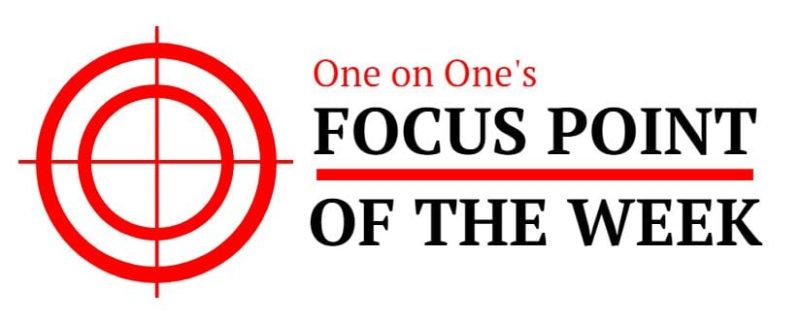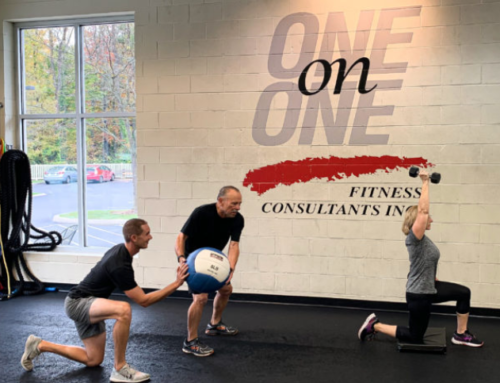
Strategies for Success
At One on One, we care about our clients positioning themselves to live their lives to the fullest…healthy and happy.
With a focus on personal/professional development, our FPOTW Series: “Strategies for Success” will hopefully motivate, educate and inspire you to reach your goals and realize your potential in 2024.
We look forward to helping you start the New Year off right!
Communication
By: Bruce Burke
Last Updated 12/31/23
Having been in the fitness business for 42 years now, I have learned quite a bit about why people succeed in achieving their health and fitness goals…as well as why they fail. To be sure, the “X’s and O’s” of fitness training are important. But the real trick is consistency and a commitment not to let life’s “curveballs” derail our efforts. When we communicate poorly, we often create these “curveballs,” and they can most certainly derail our efforts to live a healthy, happy lifestyle. At One on One, we place a high premium on excellent communication, amongst both team members and clients alike. Read on to find out what we have learned and how to practice this important skill.
KEEP IT SIMPLE
For most of us, our relationships with family, friends, and colleagues are extremely important. The significance of those relationships is what makes them so rewarding, but also what can make them stressful. Much of this stress comes from the negative consequences of easily avoidable misunderstandings. Assumptions and unfulfilled expectations breed resentment, and simple communication is the solution to these conflicts. In order to know another’s expectations of you, simply ask. Likewise, make your expectations of others explicitly understood through verbal communication rather than assuming they are clear. We are not mind readers, and we do ourselves and those around us a disservice by making careless assumptions.
Good communication shows a deeper level of caring. Every time we engage another in meaningful communication, we are making a “deposit” in our “relationship account.” We make an even bigger deposit by simply listening. Listening with a genuine intent to understand is the most important component to being an excellent communicator.
PRACTICE MAKES PERFECT
It is important to recognize that communication is something we all need to work on. Out of the hundreds of people we have interviewed for jobs over the years, none have thought of themselves as poor communicators. People generally seem to think of good communication as simply having good verbal skills. Verbal skills are important, but there are other equally important skills/techniques that are necessary to be an effective communicator. Practicing these techniques can help cut down on the stress that negatively affects your health. Putting these same techniques to work with your trainer can ensure that you’re getting the best possible support and results from your sessions here at One on One. To that end, consider the following techniques for ensuring smooth communication in any relationship:
- Be proactive. It won’t matter how great your verbal skills are if you are only using them to react to a situation/problem. Make expectations clear and understand what is expected from the beginning.
- Be clear and concise. Have a clear idea of what you want to say. Express that idea clearly, avoiding wordiness.
- Listen. Make a conscious effort to be a better listener. How many times have you had a conversation with someone and known that they were formulating their reply rather than trying to understand you? As I mentioned earlier, seek first to understand.
- Restate for understanding. Never leave an important communication without being certain you fully understand what was discussed and are on the same page with the other person. Summarizing your understanding of the conversation and any action-items that may have been discussed is a great way to do this.
- Do not avoid uncomfortable, but necessary, communications. No one cherishes this idea, but it is extremely important that we deal with reality, even when that means confronting awkward or upsetting situations. More often than not, the consequences of avoiding an uncomfortable interaction are far more difficult than the interaction itself.
There are two keys to successfully engaging difficult communication. The first is to fully understand where the other person is coming from. The second is to avoid the desire to have them embrace your point of view; you simply cannot control that. All you can control is the delivery, which will invariably be compromised if you start down the path of insisting that they agree with you.
Good communication creates an environment where inspiration, trust, creative ideas, and problem solving can flourish. It also shows that we care, reduces stress, fosters good relationships and improves our overall well-being. Inventory your communication skills today to see how you can make them better. You’ll be glad you did!




